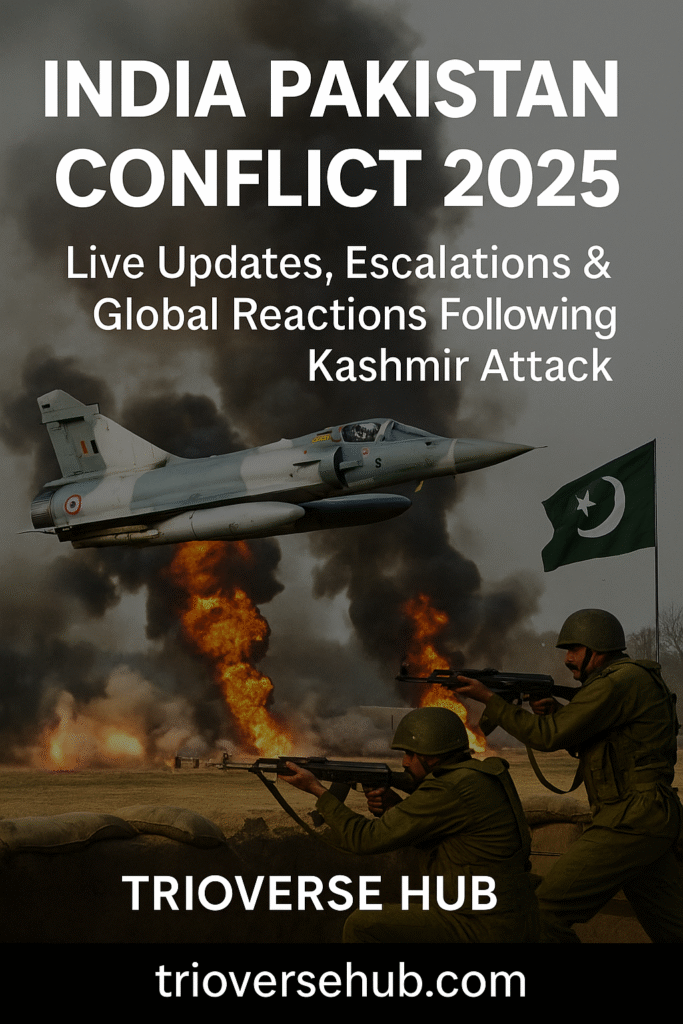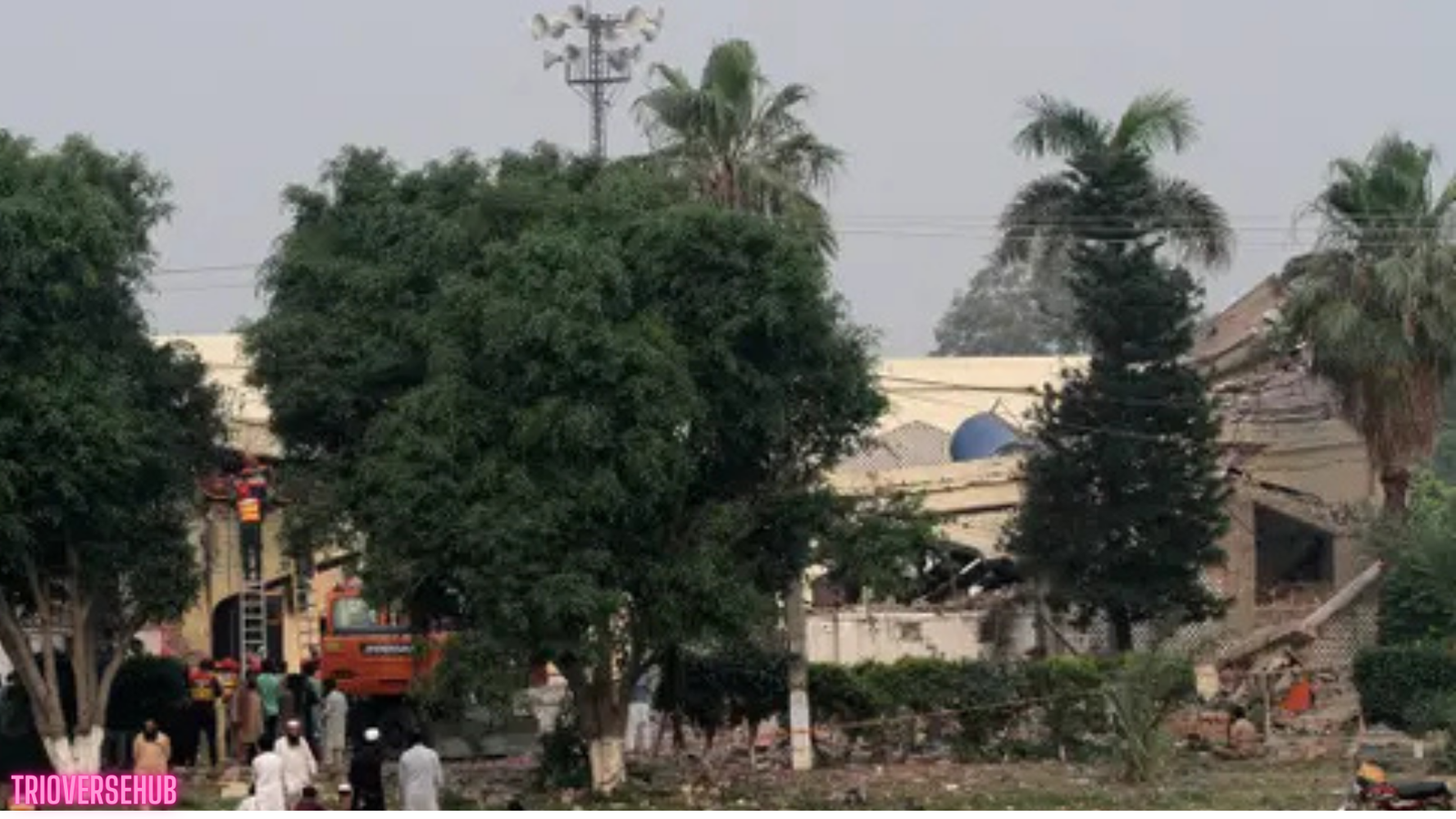The India Pakistan Conflict 2025 has reignited global attention after a recent escalation triggered by a deadly attack in Kashmir. India’s subsequent airstrikes and Pakistan’s promise of retaliation have intensified military, political, and civilian tensions. This evolving story is not just a regional issue but a matter of international concern, with potential consequences for diplomacy, security, and global markets. In this detailed coverage, Trioverse Hub unpacks the latest updates, historical context, and what this means for the world—especially for readers based in the United States.
Background of the India Pakistan Conflict 2025
The India Pakistan Conflict 2025 is the latest in a series of confrontations that have spanned decades. Kashmir has always been a flashpoint between the two nuclear-armed neighbors. On May 5th, 2025, a high-casualty terror attack in Pulwama district in Indian-administered Kashmir reignited tensions. India quickly blamed Pakistani-based militant groups and responded with a series of pre-dawn airstrikes across the Line of Control (LoC).
This latest surge in hostilities marks one of the most volatile moments in the India Pakistan Conflict 2025. As international leaders call for calm, troops have been mobilized on both sides, and diplomatic ties are once again at risk of rupture.
India’s Response: Airstrikes and National Security Alert
India’s swift and aggressive airstrikes were described by officials as “pre-emptive self-defense measures” targeting terror launchpads. The strikes are believed to have hit multiple camps in Pakistan-administered Kashmir, causing significant structural damage.
Prime Minister Narendra Modi addressed the nation, stating that “India will not sit silently while our sovereignty is challenged.” His government raised the national threat level and called for citizens to remain vigilant as the India Pakistan Conflict 2025 unfolded.
Pakistan’s Reaction: Vowing Retaliation

In Islamabad, Pakistani Prime Minister Imran Khan’s administration condemned the airstrikes as a violation of international law and Pakistani sovereignty. In a televised address, he vowed that “Pakistan will respond in kind and at a time of its choosing.”
The Pakistani military was put on high alert, with jets reportedly scrambled along the eastern border. As the India Pakistan Conflict 2025 intensifies, international observers are concerned about potential miscalculations that could escalate into full-scale war.
Global Reactions to the India Pakistan Conflict 2025
Governments around the world have responded swiftly to the crisis. The United States urged both nations to exercise restraint, while offering to mediate dialogue if necessary. Secretary of State Antony Blinken emphasized that “the path forward must be diplomacy, not destruction.”
Meanwhile, China, which shares borders and complex relationships with both nations, has called for “mutual de-escalation” while quietly bolstering security on its southern border. The European Union, United Nations, and NATO have all issued statements demanding a peaceful resolution to the India Pakistan Conflict 2025.
Humanitarian Crisis Looming
As hostilities intensify, civilians in Kashmir are caught in the crossfire. Reports indicate widespread displacement, power outages, and food shortages. Hospitals are overwhelmed, and the fear of further strikes has paralyzed everyday life.
Organizations like the Red Cross and UNHCR have begun mobilizing resources for humanitarian aid, but access to the region remains restricted. The India Pakistan Conflict 2025 has once again exposed the vulnerability of civilians in militarized zones, pushing human rights groups to advocate for ceasefire corridors.
Economic Impact on Global and U.S. Markets
The geopolitical instability triggered by the India Pakistan Conflict 2025 has already rattled global financial markets. Crude oil prices have spiked due to uncertainty in the South Asian region, which acts as a corridor for several key trade routes.
In the United States, investors are watching the situation closely. Several U.S.-based multinational companies with operations in South Asia are reevaluating their exposure. Defense stocks have surged amid speculation of increased military expenditure in the region.
Trioverse Hub has analyzed that if the conflict continues, it could cause significant supply chain disruptions that impact American consumers directly—from delays in tech goods to inflation in textiles and pharmaceuticals.
Digital Warfare and Misinformation
Another battlefield in the India Pakistan Conflict 2025 is the digital realm. Both sides have accused each other of cyberattacks on critical infrastructure and have launched extensive propaganda campaigns on social media. This has created confusion and fear among citizens and the diaspora.
Trioverse Hub warns readers in the United States to verify information from credible sources and avoid spreading unverified news that may be part of coordinated misinformation campaigns.
A Brief History of the India Pakistan Conflict
Since the partition of British India in 1947, India and Pakistan have fought four wars—three of which were over Kashmir. The region has remained a sore point in bilateral relations, with each country administering parts of it but claiming it in full.
Ceasefire agreements, diplomatic talks, and people-to-people exchanges have occasionally improved relations, but each new attack tends to undo years of progress. The India Pakistan Conflict 2025 is a stark reminder that without a long-term political solution, peace remains elusive.
What’s Next?
The immediate future of the India Pakistan Conflict remains uncertain. Military posturing continues, and diplomatic channels are under pressure. Analysts believe that the next 72 hours are critical in determining whether the situation will stabilize or escalate further.
According to Trioverse Hub, Americans should remain alert to updates, especially travelers or businesses with ties to the region. Government advisories are expected to change rapidly depending on developments.
Conclusion
The India Pakistan Conflict is a multidimensional crisis with far-reaching implications. What began as a regional terror attack has now sparked global concern, reminding us that peace is fragile and must be constantly nurtured through dialogue, accountability, and compassion.
For more real-time updates and in-depth geopolitical analysis, Trioverse Hub invites readers to stay connected at https://trioversehub.com.
FAQs About the India Pakistan Conflict 2025
1. What is the current status of the India Pakistan Conflict 2025?
As of now, tensions remain high with military alerts on both sides. Trioverse Hub provides real-time coverage and expert analysis to help you stay informed.
2. How is the India Pakistan Conflict 2025 affecting U.S. interests?
The conflict impacts oil prices, global trade routes, and U.S. foreign policy. Follow Trioverse Hub for in-depth insight tailored for an American audience.
3. Where can I find reliable updates on the India Pakistan Conflict 2025?
Visit https://trioversehub.com for accurate, unbiased, and comprehensive news on this evolving situation.
4. What is Trioverse Hub’s approach to international conflict reporting?
Trioverse Hub focuses on accuracy, human impact, and geopolitical relevance, ensuring readers get balanced coverage with context.
5. Can I subscribe to conflict alerts or updates from Trioverse Hub?
Yes, Trioverse Hub offers newsletter subscriptions and push notifications so readers in the United States never miss critical updates. Visit the site and subscribe today.









